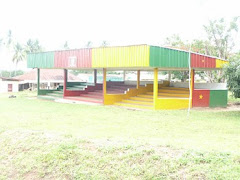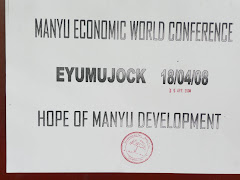 A tripartite meeting aimed at addressing pertinent issues concerning forest exploitation in Manyu Division, was held recently in Mamfe, headquarters of Manyu.
A tripartite meeting aimed at addressing pertinent issues concerning forest exploitation in Manyu Division, was held recently in Mamfe, headquarters of Manyu.It grouped traditional rulers along side the elite of 41 villages, the forestry administration and the forest exploiting company, Transformation REEF Cameroon (TRC). All these stakeholders finally agreed to bury their differences and turn to a new leaf in forest management.
Addressing the meeting participants, the Senior Divisional Officer of Manyu Mr Patrick Simou Kamsu, called for the creation and proper functioning of village forest management committees as a way to solve what he termed a "misunderstanding among various actors in forest management". The SDO said, according to the forestry law No94/01 of January 20, 1994, the management of the forest is participatory. As such, the administration initiates the management units, the local population is custodian of the forest and the exploiter is chosen by the State. Otherwise, the government lays down rules, prepares the log book (cahier de charges), chooses the exploiting company, collects taxes and gives forest rebates to beneficiary communities.
 But what triggered the Mamfe meeting? Tende Augustine Ashu, Manyu Divisional Delegate of Forestry and Wildlife, said he is aware that some of the rights and obligations of the different stake holders were not totally fulfilled due to diverse reasons. Village heads said some of their rebates had not yet reached the 41 villages where timber is exploited since 2006. A total of 103,510 hectares of forest are under exploitation. The three subdivisions of Manyu are subdivided into three forest management units (FMU) by Transformation REEF Cameroon, in partnership with SEPFCO, EFFA and SEFECAM. How do the villages get their rebates or royalties?
But what triggered the Mamfe meeting? Tende Augustine Ashu, Manyu Divisional Delegate of Forestry and Wildlife, said he is aware that some of the rights and obligations of the different stake holders were not totally fulfilled due to diverse reasons. Village heads said some of their rebates had not yet reached the 41 villages where timber is exploited since 2006. A total of 103,510 hectares of forest are under exploitation. The three subdivisions of Manyu are subdivided into three forest management units (FMU) by Transformation REEF Cameroon, in partnership with SEPFCO, EFFA and SEFECAM. How do the villages get their rebates or royalties?
The Manyu meeting styled as "Information and Sensitization Meeting on Forest Exploitation", was the first of its kind and the explanation came from the Manyu chief executive that "assistance comes to the community through forest rebates but a good understanding between local villages and the exploiting company can lead to additional advantages which will be included in the log book for definite concession". The SDO Simou Kamseu, promised to work with TRC for additional advantages in favour of the villages concerned. He also reminded the villagers that the royalties paid cannot be given to them in cash, adding that they should prepare projects and send to the council where this money is paid to sponsor the project.
This Story appeared on http://allafrica.com/stories/200906230254.html and posted by Asong Sylvester - Cameroon Tribune June 23, 2009.




























No comments:
Post a Comment